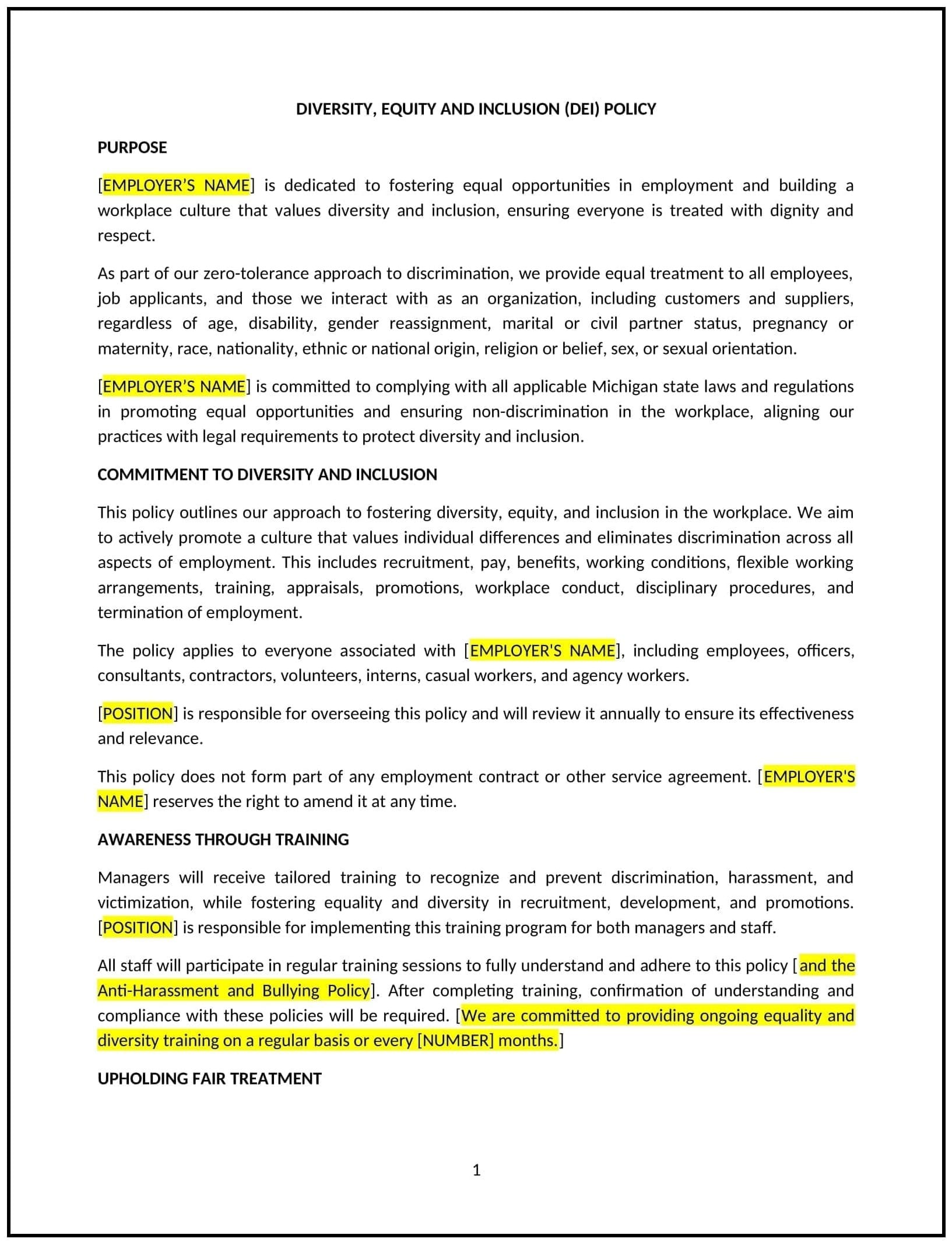Diversity, equity and inclusion (DEI) policy (Michigan): Free template
Got contracts to review? While you're here for policies, let Cobrief make contract review effortless—start your free review now.

Customize this template for free
Diversity, equity and inclusion (DEI) policy (Michigan)
A diversity, equity, and inclusion (DEI) policy provides Michigan businesses with guidelines for fostering a diverse and inclusive workplace where all employees, regardless of their background, feel valued, respected, and supported. This policy focuses on promoting equal opportunities, eliminating discrimination, and creating an environment where diversity in all forms is celebrated.
By adopting this policy, businesses can attract a wide range of talent, improve employee engagement and satisfaction, and contribute to a more positive and productive work culture.
How to use this diversity, equity, and inclusion (DEI) policy (Michigan)
- Define diversity, equity, and inclusion: Clearly define what diversity, equity, and inclusion mean for the business, including the focus on race, gender, age, sexual orientation, disability status, and other demographic factors.
- Set goals for diversity: Establish specific goals for increasing diversity within the business, such as improving the representation of underrepresented groups at all levels of the organization.
- Promote equitable opportunities: Ensure that all employees have access to the same opportunities for career advancement, training, and professional development, regardless of their background.
- Foster an inclusive environment: Encourage practices and behaviors that support inclusivity, such as creating employee resource groups, promoting open dialogue, and ensuring all employees feel valued and heard.
- Establish anti-discrimination policies: Implement policies to prevent discrimination and harassment in the workplace, addressing both subtle biases and overt acts of discrimination.
- Provide DEI training: Offer training and workshops to employees at all levels to raise awareness about unconscious bias, microaggressions, and other barriers to equity and inclusion.
- Measure and report progress: Regularly track and report progress toward DEI goals, ensuring accountability and transparency in the implementation of DEI initiatives.
- Address complaints: Create a clear process for employees to report instances of discrimination, harassment, or inequity and outline the steps for addressing these concerns in a timely and fair manner.
Benefits of using this diversity, equity, and inclusion (DEI) policy (Michigan)
This policy provides several key benefits for Michigan businesses:
- Enhances talent acquisition: By promoting diversity and equity, businesses can attract a wider pool of qualified candidates from different backgrounds, enhancing the talent available to the organization.
- Increases employee engagement and retention: Employees who feel valued and included are more likely to be engaged, productive, and stay with the business long term.
- Fosters a positive company culture: A commitment to diversity and inclusion creates a work environment where employees can be their authentic selves, fostering mutual respect and collaboration.
- Supports innovation: A diverse and inclusive workplace encourages the sharing of different perspectives, leading to greater creativity, innovation, and problem-solving.
- Reduces legal risks: By preventing discrimination and promoting equity, businesses reduce the risk of legal issues, such as lawsuits or regulatory fines related to discriminatory practices.
Tips for using this diversity, equity, and inclusion (DEI) policy (Michigan)
- Communicate the policy: Ensure that employees are aware of the DEI policy by including it in the employee handbook, sharing it during onboarding, and promoting it through regular internal communications.
- Implement ongoing training: Provide regular DEI training to all employees, particularly managers, to foster a deeper understanding of inclusion and equity principles and practices.
- Create employee resource groups: Encourage the formation of employee resource groups (ERGs) to provide support and foster community among employees from similar backgrounds or experiences.
- Foster open dialogue: Create safe spaces for open discussions about diversity, inclusion, and equity, allowing employees to share their perspectives and experiences without fear of judgment.
- Review progress regularly: Periodically assess the business’s DEI initiatives and track progress toward established goals to ensure the policy is effectively promoting a diverse and inclusive workplace.
- Address any challenges promptly: If challenges arise, such as resistance to DEI initiatives or incidents of discrimination, address them promptly through education, corrective action, and ongoing dialogue.